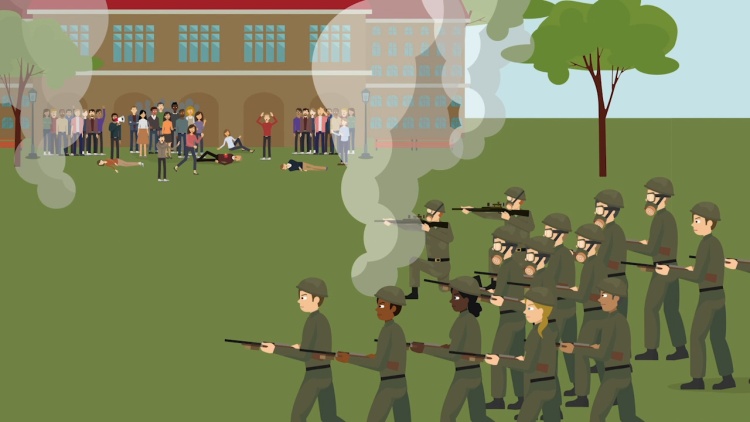Scheuer v. Rhodes
United States Supreme Court
416 U.S. 232 (1974)
- Written by Robert Schefter, JD
Facts
In May 1970, a period of civil unrest on the campus of Kent State University in Ohio led to the deaths of several college students. The estates of three students who died in the episode (plaintiffs) brought a § 1983 claim against Ohio Governor Rhodes, other state officers, enlisted members of the Ohio National Guard and the president of the university (collectively, defendants), for allegedly deploying the national guard to the university campus and ordering illegal acts that led to the students’ deaths. The complaints alleged that each of the named defendants acted outside the scope of their authority, or if within the scope, abused their powers in undertaking the alleged improper actions. The district court dismissed the complaints for lack of subject matter jurisdiction, holding that the suits were, in effect, against the state of Ohio, and thus barred by the Eleventh Amendment. The court of appeals affirmed and found alternatively that the individual defendants were entitled to executive immunity. Both courts accepted as fact the good faith of Rhodes in declaring a state of emergency and took judicial notice that “mob rule” existed on the campus at the time the officials acted. The United States Supreme Court granted certiorari.
Rule of Law
Issue
Holding and Reasoning (Burger, C.J.)
What to do next…
Here's why 904,000 law students have relied on our case briefs:
- Written by law professors and practitioners, not other law students. 47,100 briefs, keyed to 995 casebooks. Top-notch customer support.
- The right amount of information, includes the facts, issues, rule of law, holding and reasoning, and any concurrences and dissents.
- Access in your classes, works on your mobile and tablet. Massive library of related video lessons and high quality multiple-choice questions.
- Easy to use, uniform format for every case brief. Written in plain English, not in legalese. Our briefs summarize and simplify; they don’t just repeat the court’s language.





